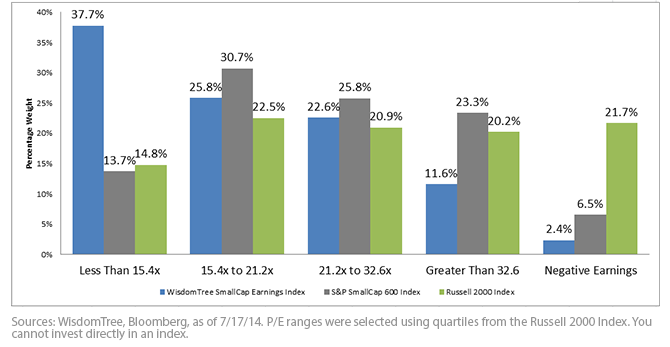Stocks often move more than is justified by changes in their underlying
fundamentals, and as a result, investors run the risk of paying too much for stocks that have become more expensive relative to their fundamentals. As an example, we look at the
Russell 2000 Index, a
market cap barometer for U.S.
small-cap stocks.
Our friend Michael Batnick nicely summarized some of the recent activity in small caps on his blog on July 18, 2014: “After outperforming large caps for the last 15 years, small caps—which have been lagging all year—are 7% off their recent highs and below every moving average, […] 40% of Russell 2000 stocks are down 20% from their 52-week highs."
1
The Fundamental Difference
At WisdomTree, we’re mindful of fundamentals, especially after times of strong market performance led by
momentum and
multiple expansion. Additionally, we believe weighting by market capitalization, which does not weight, consider or rebalance back to any fundamental value, may not be the best approach. Rather, we employ a disciplined strategy of anchoring allocations back to a concept of
relative value, based on fundamentals such as
dividends or earnings, that can add value over time.
The WisdomTree Earnings Indexes seek to provide exposure to the core, profitable segment of the market while maintaining sensitivity to
valuation. WisdomTree weights companies in the Indexes by the profits they generate (rather than by market cap) and rebalances back to profitability on an annual basis. Ultimately, the rebalancing process refreshes constituent weights based on a measure of relative value. Weights change at the rebalance based on each stock’s relative price appreciation compared to its relative earnings growth.
This process tends to shift more weight to firms that have lower
price-to-earnings (P/E) ratios than is the case for the widely followed market cap-weighted indexes.
P/E Ratio and Weight Distribution
The P/E ratio for the
WisdomTree SmallCap Earnings Index is approximately 16.4x, about 37% lower than the 26.0x P/E ratio of the
Russell 2000 Index and 20% lower than the 20.5x P/E ratio of the
S&P SmallCap 600 Index2. The chart below provides a look at how the weight is distributed, to give a sense for why this lower P/E ratio is seen at the aggregate index.

•
More Weight to Lower-Priced Stocks – The WisdomTree SmallCap Earnings Index has over one-third of its weight in the lowest-priced stocks, which is over 2.5 times more weight than the S&P SmallCap 600 or the Russell 2000. There is a natural tendency of earnings-weighted approaches to reduce weight to stocks whose prices have appreciated at a faster rate than their earnings, and concurrently to increase weight to stocks that have fallen in price despite exhibiting positive earnings growth.
•
Less Weight to Higher-Priced and Speculative Stocks – Although profitability may fluctuate throughout the year, at each annual rebalance WisdomTree requires companies be profitable before inclusion. This limits the weight to firms that tend to be more speculative and lower quality at zero. Neither of the market cap-weighted indexes above has such a requirement.
•
Russell 2000 Index Had Highest Weight to Firms with Negative Earning – We feel it is important to highlight that over 20% of the Russell 2000 Index is in stocks that had negative earnings over the past 12 months. It is important to be mindful of this fact when the Russell 2000 is used as a benchmark for small caps in general, because not all indexes are created the same.
1Michael Batnick, The Irrelevant Investor, 7/18/14 (theirrelevantinvestor.tumblr.com/post/92145310258/if-mr-market-took-a-selfie).
2WisdomTree, Bloomberg, as of 7/17/14.
Important Risks Related to this Article
Investments focusing on certain sectors and/or smaller companies increase their vulnerability to any single economic or regulatory development.


 • More Weight to Lower-Priced Stocks – The WisdomTree SmallCap Earnings Index has over one-third of its weight in the lowest-priced stocks, which is over 2.5 times more weight than the S&P SmallCap 600 or the Russell 2000. There is a natural tendency of earnings-weighted approaches to reduce weight to stocks whose prices have appreciated at a faster rate than their earnings, and concurrently to increase weight to stocks that have fallen in price despite exhibiting positive earnings growth.
• Less Weight to Higher-Priced and Speculative Stocks – Although profitability may fluctuate throughout the year, at each annual rebalance WisdomTree requires companies be profitable before inclusion. This limits the weight to firms that tend to be more speculative and lower quality at zero. Neither of the market cap-weighted indexes above has such a requirement.
• Russell 2000 Index Had Highest Weight to Firms with Negative Earning – We feel it is important to highlight that over 20% of the Russell 2000 Index is in stocks that had negative earnings over the past 12 months. It is important to be mindful of this fact when the Russell 2000 is used as a benchmark for small caps in general, because not all indexes are created the same.
1Michael Batnick, The Irrelevant Investor, 7/18/14 (theirrelevantinvestor.tumblr.com/post/92145310258/if-mr-market-took-a-selfie).
2WisdomTree, Bloomberg, as of 7/17/14.
• More Weight to Lower-Priced Stocks – The WisdomTree SmallCap Earnings Index has over one-third of its weight in the lowest-priced stocks, which is over 2.5 times more weight than the S&P SmallCap 600 or the Russell 2000. There is a natural tendency of earnings-weighted approaches to reduce weight to stocks whose prices have appreciated at a faster rate than their earnings, and concurrently to increase weight to stocks that have fallen in price despite exhibiting positive earnings growth.
• Less Weight to Higher-Priced and Speculative Stocks – Although profitability may fluctuate throughout the year, at each annual rebalance WisdomTree requires companies be profitable before inclusion. This limits the weight to firms that tend to be more speculative and lower quality at zero. Neither of the market cap-weighted indexes above has such a requirement.
• Russell 2000 Index Had Highest Weight to Firms with Negative Earning – We feel it is important to highlight that over 20% of the Russell 2000 Index is in stocks that had negative earnings over the past 12 months. It is important to be mindful of this fact when the Russell 2000 is used as a benchmark for small caps in general, because not all indexes are created the same.
1Michael Batnick, The Irrelevant Investor, 7/18/14 (theirrelevantinvestor.tumblr.com/post/92145310258/if-mr-market-took-a-selfie).
2WisdomTree, Bloomberg, as of 7/17/14.

